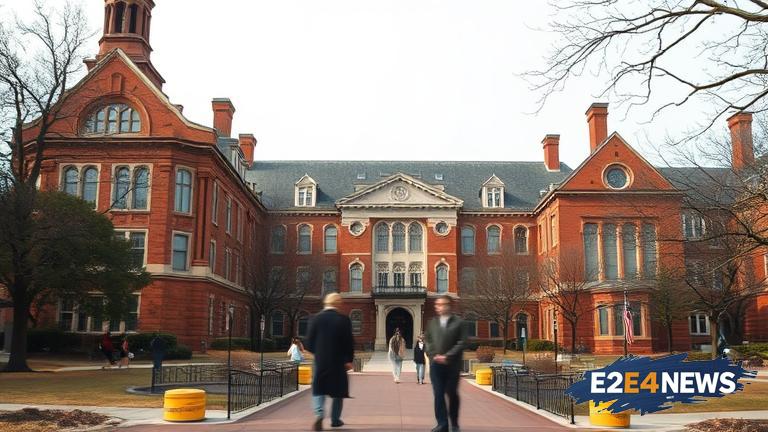Brown University, a prestigious Ivy League institution, has been embroiled in controversy over its response to antisemitism on campus. The issue has sparked heated debate, with some arguing that the school has not done enough to protect its Jewish students. The controversy began when the university agreed to a Trump administration order that would withhold funding from institutions that do not combat antisemitism. However, some have argued that the order is overly broad and could be used to stifle free speech. The university’s decision to comply with the order has been met with criticism from some students and faculty, who argue that it could have a chilling effect on academic freedom. Others have argued that the university has a responsibility to protect its Jewish students from antisemitism, and that the order is a necessary step in achieving that goal. The issue has highlighted the complex and often fraught relationship between free speech and hate speech on college campuses. Some have argued that universities have a responsibility to balance the need to protect students from hate speech with the need to preserve academic freedom. Others have argued that universities have a responsibility to take a more proactive role in combating antisemitism, even if it means limiting free speech. The controversy at Brown University is not an isolated incident, but rather part of a larger national conversation about antisemitism on college campuses. According to a recent report, antisemitic incidents have increased significantly in recent years, with many universities struggling to respond effectively. The report found that many universities lack clear policies and procedures for addressing antisemitism, and that many students and faculty feel that their concerns are not being taken seriously. The issue has also sparked debate about the role of the federal government in combating antisemitism on college campuses. Some have argued that the Trump administration’s order is an overreach of federal authority, while others have argued that it is a necessary step in protecting Jewish students. The controversy at Brown University has also highlighted the importance of education and awareness in combating antisemitism. Many experts argue that universities have a critical role to play in educating students about the dangers of antisemitism and the importance of respecting diversity and inclusivity. By providing students with a comprehensive education about antisemitism and its history, universities can help to prevent incidents of hate speech and promote a more inclusive and respectful campus culture. Furthermore, universities can also take steps to create a more welcoming and inclusive environment for Jewish students, such as providing kosher dining options and hosting cultural events that celebrate Jewish heritage. In addition, universities can work to build partnerships with local Jewish organizations and communities, in order to provide students with opportunities for engagement and outreach. Ultimately, the controversy at Brown University serves as a reminder of the ongoing challenges that universities face in combating antisemitism and promoting a culture of respect and inclusivity. By working together and engaging in open and honest dialogue, universities can help to create a safer and more welcoming environment for all students, regardless of their background or identity. The issue of antisemitism on college campuses is complex and multifaceted, and it will require a sustained and collective effort to address it effectively. However, by prioritizing education, awareness, and inclusivity, universities can help to promote a more just and equitable society for all. The Brown University controversy has sparked a national conversation about the need for universities to take a more proactive role in combating antisemitism, and it has highlighted the importance of protecting Jewish students from hate speech and discrimination. As the conversation continues, it is likely that we will see a growing focus on the importance of education and awareness in combating antisemitism, as well as a greater emphasis on creating inclusive and welcoming campus environments. In the end, the goal of combating antisemitism on college campuses is not only to protect Jewish students, but to promote a more just and equitable society for all. By working together and engaging in open and honest dialogue, we can help to create a brighter future for generations to come.





